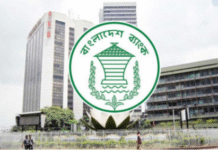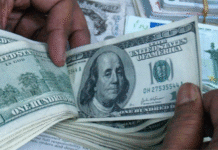
Investors were in a rush on the day for selling their shares to avoid further losses, market insiders said
Dhaka stocks plunged by 2.11% to 4,123 points, the lowest since May 2015 as the investors went on a selling spree amid an acute crisis of confidence in the future course of the market.
DSEX, the key index of Dhaka Stock Exchange (DSE), lost 88 points yesterday and slumped to 4,123 points, the lowest in the last 56 months, DSE data showed.
On the other hand, the daily turnover at DSE stood at Tk286 crore, up by 10% or Tk26 crore compared to Tk260 crore in the previous session. The rise in turnover is due to the sell pressure, which dragged down the key index.
In continuation of last year’s free fall, the stock market has kept on bleeding in the new year and in last nine trading sessions, DSE shed 329 points.
In 2019, the key index of the DSE saw 17.3% or 937 points decline to end the year at 4,453 points.
Why free fall continues
Stock market analysts and brokers largely blame investors’ shaky confidence, liquidity crisis, poor performance of companies, falling macroeconomic indicators and sell-offs by foreign investors for the free fall.
“Stock investors have long been suffering from confidence crisis, while below par data on major macroeconomic indicators have kept on dampening investors’ confidence badly,” EBL Securities, a stock broker, said in its market commentary.
In addition, Grameephone tussle with the telecommunication regulator and fear over distressed earnings once the single digit lending rate would take effect in April gave the investors a gloomy picture, said the stock broker.
Meanwhile, former BSEC chairman Faruq Ahmed Siddiqi noted that absence of regulatory action against manipulation and lack of proper enforcement of laws dampened investors confidence prompting sell-offs.
On top of that, selling pressure from foreign investors also expedited the fall, he added.

According to DSE data, in the last year, foreign investors withdrew Tk488.
Foreign buyers are leaving the market to book profits as the US dollar is becoming weak against Taka amid government’s unwillingness to devalue local currency, former World Bank lead economist in Dhaka Zahid Hussain told Dhaka Tribune.
But the prime reason for the continued fall in share value was lack of good governance and transparency in financial reports, he added.
He also urged Bangladesh Securities and Exchange Commission (BSEC) for making flawless financial statement of listed companies and initial public offering (IPO), which was essential to show the real financial health of a company.
Amid the confidence deficiency, fund crisis has emerged as another big reason, which kept institutional investors away from investment.
“Subsidiaries of banks and financial institutions are suffering from cash shortage as they are witnessing unstoppable non-performing loans, while government decision of bringing down the lending rate to single digit make them skeptical in making investment,” said Professor Mizanur Rahman of Accounting and Information Systems Department at Dhaka University.
Moreover, stakeholders and stock brokers have expressed their discontent over the appointment of managing director, currently under process, as the DSE board is divided over it, evincing the divide among the stakeholders.
“We are not getting fund from our mother companies to invest in the stock market. The mother companies are suffering from fund crisis as the government has borrowed a huge amount of money from banks,” said a top official of stock broker of a bank.
What to do
As the confidence deficiency and fiscal transparency are major concerns of investors, economists have suggested restoring confidence through accountability.
“The attempt to bring stability in the stock market by injecting funds has not been successful and it have proved that an artificial solution is unable to bring to life a dying stock market,” said Zahid Hussain.
So, the focus should be on stopping foul play by bringing the manipulators to book and there should be an institutionalized mechanism to verify the financial statement published by the companies, he suggested.
Another economist, however, thinks that government can inject fund to boost investors’ confidence.
“If the government wants to restore investor’s confidence, the government can pump fund through Investment Corporation of Bangladesh (ICB) and other government entities,” Professor Abu Ahmed, a stock market expert, told Dhaka Tribune.
Markets on Monday
Among the traded issues, 21 gained, 313 declined and 20 remained unchanged at the Dhaka bourse on the day.
DSE Shariah-based index DSES declined 2.13% to end at 929.9 points, while blue-chip index, DS30, went down by 1.97% to close at 1,387.8 points.
The engineering sector contributed 15.7% of the total turnover while textile, pharmaceuticals and insurance sectors contributed 10.6%, 10.5% and 8.9% respectively, showed the daily market analysis of UCB Capital Management Limited.
All of the sectors were down as Telecom, NBFI, and Food and Allied took the highest toll. Among large-cap stocks, Grameenphone, BATBC and Square Pharma were 4.35%, 3.13%, and 2.09% down respectively.
The port city’s bourse, Chittagong Stock Exchange, also registered massive loss at the end of the session. The selected index, CSCX, and all Share Price Index, CASPI declined by 148.4 and 238.7 points respectively.
Market capitalization at DSE has dropped Tk20,475 crore in the last nine trading sessions this year.
As of Monday, DSE market value declined to Tk3,19,076 crore from Tk3,39,551 crore on December 30, 2019.
Meanwhile, the key index, DSEX, of Dhaka bourse lost 329.45 points during the period.









